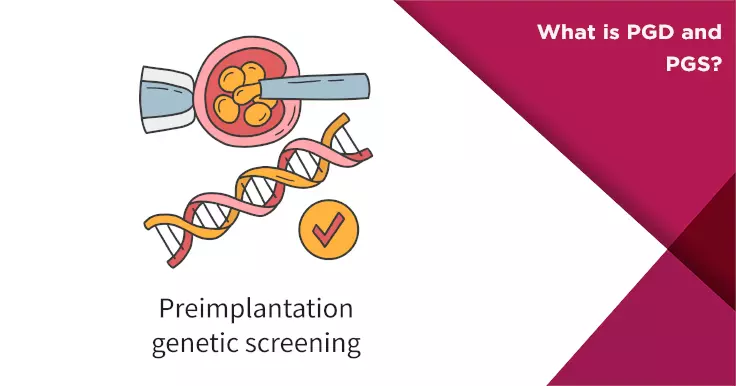What Are PGD and PGS? Genetic Testing in Fertility Treatment

A couple who undergoes fertility treatment such as IVF may be advised to have their embryos undergo genetic testing before they are implanted. The two tests conducted on embryos are Preimplantation genetic diagnosis (PGD) and Preimplantation Genetic Screening (PGS). After the tests, only the embryos that are free of genetic abnormalities are implanted in the woman's uterus.
What is PGD?
PGD is a type of genetic screening used to detect genes linked to specific diseases. If either the man or the woman has a family history of a certain genetic disease, this test can help ensure that the child born out of IVF will not have the condition. It is not necessary for either parent to be suffering from the disease for the test to be conducted. In many cases, a person may be only a carrier of the gene.
Some of the diseases that PGD is used to test for include:
- Huntington's Disease
- Exchange of chromosomal material that may cause a miscarriage, mental retardation or birth defects
- Marfan Syndrome
- Cystic Fibrosis
- Hemophilia
- Duchenne Muscular Dystrophy
- An abnormal number of chromosomes
What is PGS?
PGS is used to determine if the cells in the embryo have the right number of chromosomes. Normal, healthy humans have a total of 23 pairs of chromosomes.
IVF has a high risk of multiple pregnancies. Usually, 2-3 embryos are implanted in the uterus to maximize the chances of a successful pregnancy. If genetic screening tests are conducted before implantation, it may be possible to implant only a single embryo and thus avoid the risk of multiple pregnancies. This is because having more or less than the normal number of chromosomes is one of the most common reasons why an embryo fails to be implanted in the uterus and of miscarriages.
The risk of an abnormal number of chromosomes increases with a woman's age. Thus, this test is usually recommended for women who are above 35 years of age and trying to have a family through IVF. It may also be recommended if the woman has had recurrent miscarriages.
PGS is not used to test for specific diseases. As compared to the PGD test, this is a much simpler test. However, it can be used to detect Down Syndrome. This is because this disease is caused by an extra chromosome Trisomy 21, being present in the person's DNA. This screening may be used for gender selection.
What You Should Know about PGD and PGS
These tests are not an essential step of the IVF process. Thus, the cost of undergoing these tests is usually not included in the cost of an IVF cycle.
Both these tests use an amniotic fluid sample which is usually taken on day three after the embryo culture. When this sample is taken, the health of the embryo is at risk. If the embryo is damaged, it will not result in a successful pregnancy. In addition, the PGS test requires samples for 5 to 6 embryos. In the case of older women, this may not be possible in a single IVF cycle. Hence, these women may require more than one IVF cycle to develop enough embryos for testing.
Hence, it is important to work with a good fertility center that has expert doctors and to undergo these tests only if required.
Which Test Do You Need?
Not all couples undergoing IV are advised to take both tests. The test a couple should take depends on many factors such as whether or not they have had earlier unsuccessful IVF cycles, past miscarriages, their medical history, a family history of genetic diseases etc.
 Infertility Counselling
Infertility Counselling Female Infertility Treatment
Female Infertility Treatment Andrology Treatment
Andrology Treatment Fertility Enhancing Surgeries - Female
Fertility Enhancing Surgeries - Female Fertility Enhancing Surgeries - Male
Fertility Enhancing Surgeries - Male Endoscopy Treatment
Endoscopy Treatment IUI Treatment
IUI Treatment IVF Treatment
IVF Treatment ICSI Treatment
ICSI Treatment Advanced IVF Solutions
Advanced IVF Solutions Embryology
Embryology Vitrification Egg, Embryo, Sperm Freezing
Vitrification Egg, Embryo, Sperm Freezing Preimplantation Genetic Testing (PGT)
Preimplantation Genetic Testing (PGT) Donation Program Embryo / Egg / Sperm
Donation Program Embryo / Egg / Sperm Self-cycleTM IVF
Self-cycleTM IVF

 Self-cycleTM IVF
Self-cycleTM IVF










